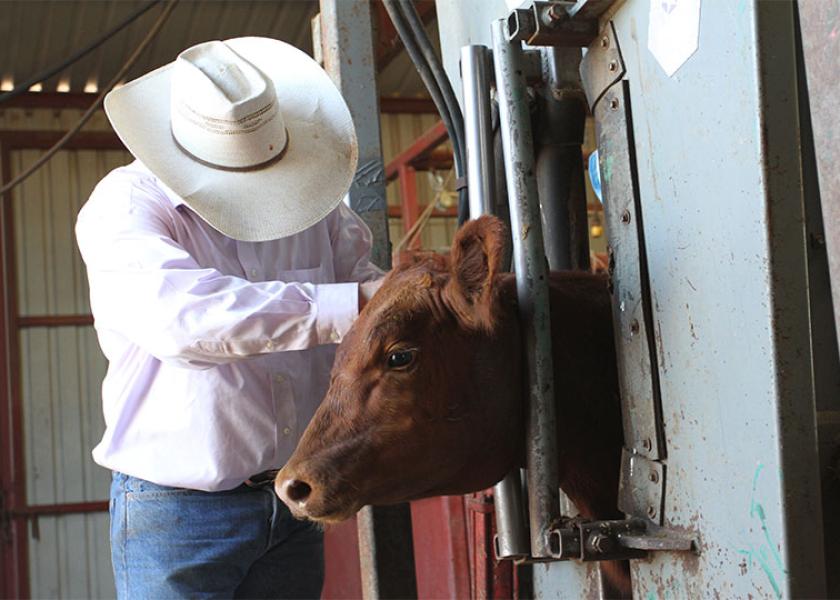OTC Livestock Antibiotics Will Require Prescription June 11

Don’t wait. Get to know your local veterinarian now and establish a veterinarian-client-patient relationship if you expect to treat livestock in the future, as over-the-counter livestock antibiotics will soon require a prescription.
That is the advice of a team of Texas A&M AgriLife Extension Service experts trying to help livestock owners who are used to going to the local feed store to buy some of their antibiotics and administer treatment themselves.
All of that will change on June 11, when these medically important antimicrobial drugs will require veterinary oversight.
The following experts answer some frequently asked questions to let livestock owners know what to expect:
— Tom Hairgrove, DVM, Ph.D., AgriLife Extension cattle veterinary specialist in the Texas A&M College of Agriculture and Life Sciences Department of Animal Science, Bryan-College Station.
— Joe Paschal, Ph.D., former AgriLife Extension livestock specialist, now representing industry as the executive vice president of the American Brahman Breeders Association, Corpus Christi.
— Billy Zanolini, Ph.D., assistant professor and 4-H and youth development specialist, Bryan-College Station.
What is the new rule?
The Food and Drug Administration recommends manufacturers of medically important antimicrobial drugs that continue to be available over the counter and are approved for use in animals, both companion and food-producing, regardless of delivery mechanism, to voluntarily bring these products under veterinary oversight or prescription marketing status.
By June 11, labels of the remaining over-the-counter antibiotics for livestock use will be required to read: “Caution: Federal law restricts this drug to use by or on the order of a licensed veterinarian,” and the purchaser must have a prescription or drug order to buy it.
How does this differ from the Veterinary Feed Directive and why are the two confused?
Over-the-counter antibiotics used in animal feed were moved to Veterinary Feed Directive, VFD, in 2017, allowing closer veterinarian oversight of antimicrobial use in animal feeds. All over-the-counter antibiotics placed in the drinking water were moved to prescription status at the same time. This new rule concerns the few antibiotics that remained available over the counter in the form of injectables, intramammary tubes and boluses.
What does medically important mean?
Medically important drugs are essential to human medicine and also used to treat animals.
What antibiotics does this affect?
Prescription-only items will include injectable tylosin, injectable and intramammary penicillin, injectable and oral oxytetracycline, sulfadimethoxine and sulfamethazine, gentamicin, cephapirin and cephapirin benzathine intramammary tubes.
How and where can these items be purchased after the rule goes into effect?
Individuals with veterinary-client-patient relationships, VCPR, may purchase antibiotics directly from their veterinarian or from a distributor with the vet’s prescription.
What constitutes a VCPR?
Three requirements must be met:
(1) The veterinarian has assumed the responsibility for making clinical judgments regarding the health of the animal and the need for medical treatment, and the client has agreed to follow the veterinarian’s instructions.
(2) The veterinarian has sufficient knowledge of the animal to initiate at least a general or preliminary diagnosis of the animal’s medical condition. This means that the veterinarian has recently seen and is personally acquainted with the keeping and care of the animal by examining the animal or by medically appropriate and timely visits to the premises where the animal is kept.
(3) The veterinarian is readily available or has arranged emergency coverage and follow-up evaluation in the event of adverse reactions or the failure of the treatment regimen.
What’s your advice to livestock owners without a VCPR?
Producers who already have a VCPR in place and purchase their animal health products through their veterinary office or through other distributors under an existing prescription system will likely notice little change. However, this may have significant impacts on how the livestock owners can access antibiotic therapy for their animals, so contact your local veterinarian as soon as possible.
Why shouldn’t I go ahead and stock up on antibiotics now?
Do not stock up on these products to avoid needing a prescription once this change takes effect. Animal health products are expensive, have expiration dates and are sensitive to storage time and conditions.
Are there any specific instructions that should be given to livestock show exhibitors?
Livestock exhibitors, like all producers in animal agriculture, are responsible for understanding animal treatment regulations. For junior shows, students complete the “Quality Counts” quality-assurance curriculum that stresses the importance of VCPR.
What health/medical items can livestock owners continue to purchase over the counter?
Most vaccines, dewormers, injectable and oral nutritional supplements, ionophores, pro/prebiotics and topical nonantibiotic treatments will not require a veterinary prescription. However, there are some exceptions. Always read the label.







